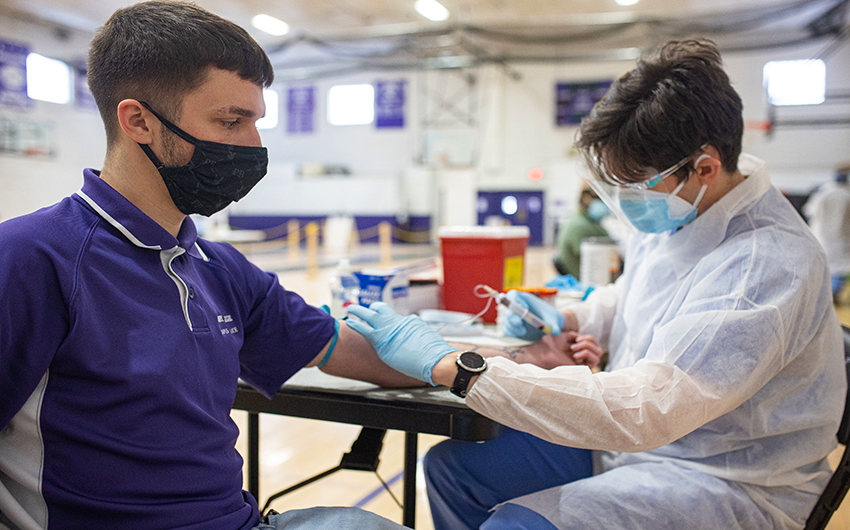
TOPICS:
In an effort to help advance the understanding of the coronavirus, Curry College has partnered with Emory University to conduct a new study on campus examining the role of antibodies and virus infection in a college community. Beginning this week, up to hundreds of Curry faculty, staff, and students will volunteer to contribute to the new research, which will allow epidemiologists from Emory’s Rollins School of Public Health better understand how COVID-19 may spread on a residential campus and which antibodies protect from infection or reinfection. The College is the only institution in the U.S. to take part in this study. Emory selected Curry because of the College’s success in managing positive cases and keeping the community on campus together during this academic year.
“We could not be prouder to team with Emory’s expert researchers on this important study,” says Dr. David Szczerbacki, executive vice president and provost. “The partnership presents a unique opportunity for our campus community to play a meaningful part in expanding our knowledge of COVID-19 and ultimately helping to gain control of this tragic pandemic.”
The partnership comes at a critical time as the pandemic surpasses its one-year mark since COVID-19 was detected in the country. Since then, a growing proportion of the U.S. population has been previously infected with the virus. Medical experts theorize that prior infection and the presence of COVID-19 antibodies convey some degree of immunity to reinfection, though little is still known. Emory’s researchers believe a better understanding of the COVID-19 immune response and disease transmission on a college campus is critical for control strategies.
“We are excited to partner with Curry College to look at the durability and protective nature of natural antibodies, and hopefully antibodies from vaccination, in a residential college setting,” says Dr. Jodie Guest, Professor of Epidemiology and one of the co-principal investigators from Emory University.
“A growing proportion of the U.S. population has been infected with the SARS-CoV-2 virus and while it is hypothesized that antibodies from prior infection convey some degree of immunity to reinfection, this has not been well studied. Additionally, we hope to use the data to help schools and universities mitigate the spread of SARS-CoV-2 as they adapt to these new learning environment challenges,” says Dr. Patrick Sullivan, the Charles Howard Candler Professor of Epidemiology at Emory University, and co-principal investigator.
Conducted on the Milton campus, study participants will contribute a small blood sample in February and May to allow Emory’s public health experts to monitor for the presence of antibodies and their relationship to any positive COVID-19 cases this spring. Collecting data on antibodies is especially important given the prevalence of asymptomatic cases. The study is one of the first to focus on a residential living environment. It could help inform practices for disease control in the future for both college campuses and senior living communities.
“I’m excited to participate in the study because I want to make an impact in our community,” says Christopher Jenkins ’24, a business administration major. “I take the COVID pandemic very seriously. I know people who have lost their loved ones and so if I can help make a change in the world, then I am all for it.”
With the new partnership, Curry supports Emory’s leading COVID-19 research, which has received more than $88 million in federal grants to date. The research leader runs dozens of emerging studies that span the spectrum of the infectious disease – from advancing the understanding of the virus to coming up with quicker and more accurate tests to finding treatments and a vaccine.
The College’s success in managing positive cases is a result of Curry’s proactive campus-wide weekly surveillance testing program led by the Broad Institute – which has administered more than 25,000 tests to date. It allows College administrators to act quickly to isolate the infected and exposed and keep the 14-day positivity rate on campus consistently below both Milton and Massachusetts rates.
As part of the collaboration, Curry faculty members may also have access to the survey data. They can integrate the raw findings within course materials or case studies to enhance the curriculum in public health, biology, or biochemistry. The one-of-a-kind clinical study represents yet another opportunity to create relevant, experiential learning opportunities for students on campus.